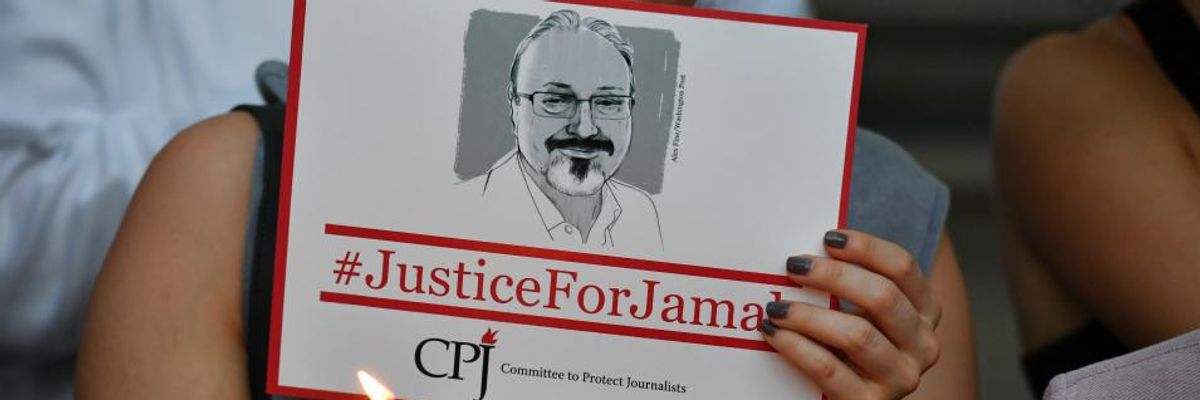Human rights advocates criticized Saudi Arabia Monday following an announcement from the nation's public prosecutor that five people were sentenced to death and three others given various prison terms in connection with the brutal murder of Saudi journalist Jamal Khashoggi in Turkey last year.
"When Saudis sentence five to death for Khashoggi's murder, we fear that it is a way to silence them for ever and to conceal the truth," tweeted Christophe Deloire, secretary-general of Reporters Sans Frontieres, also known as Reporters Without Borders. "We cannot consider death penalty helps to bring justice. We still expect a full accounting."
Khashoggi, a U.S. resident and Washington Post columnist, was last seen entering the Saudi consulate in Istanbul on Oct. 2, 2018. Turkish investigators believe he was murdered by a Saudi hit team and his body was dismembered. The CIA determined last year that the murder was likely orchestrated by Saudi Crown Prince Mohammed bin Salman (MBS). In June, Agnes Callamard--U.N. special rapporteur on extrajudicial, summary, or arbitrary executions--released a report which concluded that Khashoggi was "the victim of a brutal and premeditated killing," and it was "inconceivable" MBS would not "at a minimum" be aware of a plot to kill the journalist.
In a September interview with CBS News, the crown prince maintained that he did not order Khashoggi's assassination but said that he took "full responsibility as a leader in Saudi Arabia, especially since it was committed by individuals working for the Saudi government." Just days later, on the one-year anniversary of Khashoggi's disappearance, a U.S.-based law firm revealed that it had in July filed a petition at the International Criminal Court to investigate MBS. Khashoggi's killing has led to increased scrutiny of Saudi Arabia and the U.S. government's relationship with the kingdom--particularly the Trump administration's interactions with the crown prince.
Callamard responded to the news out of Saudi Arabia Monday with a series of tweets in which she detailed "why the sentence today is anything BUT justice."
"Under international human rights law, the killing of Mr. Khashoggi was an extrajudicial execution for which the state of Saudi Arabia is responsible. But at no point did the trial considered the responsibilities of the state," Callamard explained. "The execution of Jamal Khashoggi demanded an investigation into the chain of command to identify the masterminds, as well as those who incited, allowed or turned a blind eye to the murder, such as the crown prince. This was not investigated."
"Bottom line: the hit-men are guilty, sentenced to death. The masterminds not only walk free. They have barely been touched by the investigation and the trial. That is the antithesis of justice. It is a mockery," she continued. "Impunity for the killing of a journalist commonly reveals political repression, corruption, abuse of power, propaganda, and even international complicity. All are present in [Saudi Arabia's] killing of Jamal Khashoggi."
Reporting on the trial's conclusion Monday, the Postnoted that "the verdicts came after a trial in Riyadh's criminal court that lasted nearly a year and was largely shrouded in secrecy, with court sessions closed to the general public. Human rights groups warned that the lack of transparency made the proceedings unfair, and increased the likelihood that senior officials could escape justice."
The case involved 31 individuals--10 of whom were questioned and 21 of whom were arrested, the public prosecutor said. The investigation led to the indictment of 11 individuals; the other 10 who were arrested were released due to insufficient evidence. Ultimately, the court found eight people guilty and dismissed charges against the remaining three individuals.
Of those found guilty, five face the death penalty for "committing and directly participating in the murder" and three face prison sentences totaling 24 years for "their role in covering up this crime and violating the law." Shalaan al-Shalaan, a spokesperson for the Saudi public prosecutor, said that the death sentences must be confirmed by higher courts, according to the Post. Shalaan called Khashoggi's killing a "snap decision," explaining that the Saudi investigation found "there was no prior intention to kill at the start of this mission."
The identities of those found guilty are not publicly known. However, The New York Timesreported Monday that Mohammed al-Otaibi, the Saudi consul in Istanbul, and Ahmed Asiri, the deputy head of Saudi intelligence, were both found not guilty and Saud al-Qahtani, an aide to MBS who faced sanctions from the United States over Khashoggi's killing, was not tried due to lack of evidence.
According to the Times:
Adam Coogle, who researches Saudi Arabia for Human Rights Watch, said that the opaque nature of the trial, and the kingdom's overall handling of the case, could only be resolved through an independent investigation.
"Saudi Arabia's absolution of its senior leadership of any culpability in the murder of Jamal Khashoggi raises serious concerns over the fairness of the criminal proceedings," he said. "Saudi Arabia's handling of the murder, from complete denial to hanging the murder on lower-level operatives in a trial that lacked transparency, demonstrates the need for an independent criminal inquiry."
Coogle's criticism was echoed by other human rights advocates Monday. Among them was Amnesty International's Middle East research director Lynn Maalouf, who put out a scathing statement in response to the Saudi prosecutor's announcement.
"This verdict is a whitewash which brings neither justice nor the truth for Jamal Khashoggi and his loved ones. The trial has been closed to the public and to independent monitors, with no information available as to how the investigation was carried out," said Maalouf. "The verdict fails to address the Saudi authorities' involvement in this devastating crime or clarify the location of Jamal Khashoggi's remains."
"Saudi Arabia's courts routinely deny defendants access to lawyers and condemn people to death following grossly unfair trials," she added. "Given the lack of transparency from the Saudi authorities, and in the absence of an independent judiciary, only an international, independent and impartial investigation can serve justice for Jamal Khashoggi."
